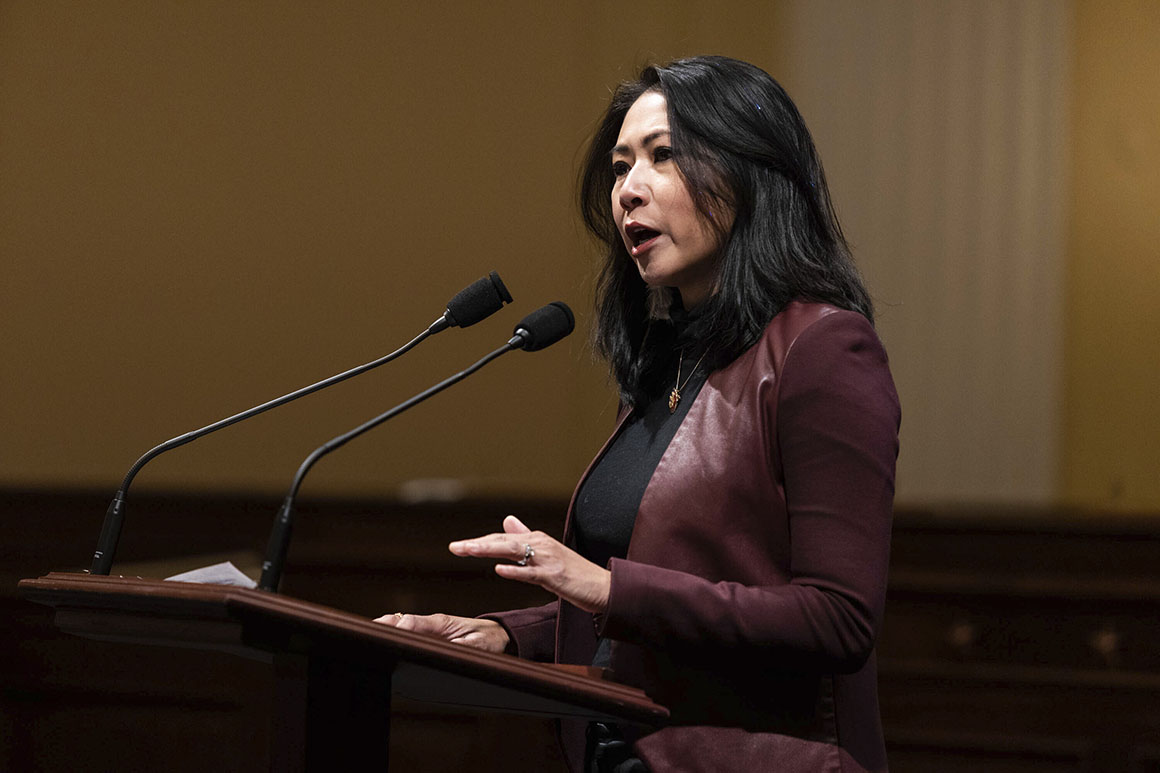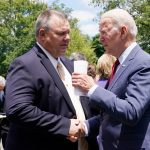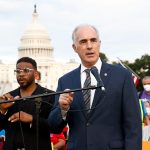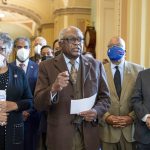Rep. Stephanie Murphy (D-Fla.) pioneered the playbook that helped Democrats flip the House in 2018. Less than four years later, she announced her retirement. Her experience has raised alarms about the Democratic Party going forward.
Today, Playbook co-author Rachael Bade sits down with Murphy to talk about how the Democratic House leadership’s insistence on absolute party unity is fracturing the Dems and putting their congressional majority at risk. A transcribed excerpt from that conversation is below, edited for length and readability.
Rachael Bade: You shocked everyone in Washington, including John Mica, when you ousted him. The DCCC after that started to look to you and what you did in this race, talking about national security, about pocketbook issues, as a sort of playbook to replicate in 2018 when they were trying to flip the House. They ended up recruiting a lot of women who had a very similar mold. You worked at the Pentagon. People like Reps. Elissa Slotkin (D-Mich.), Abigail Spanberger (D-Va.), folks who were in the CIA, who served in the military, mothers who went onto defeat Republicans in long-held Republican districts, flipped the House by 40 seats. Again, not talking about former President Donald Trump at all, so it was definitely something that rocked Washington.
One thing I thought was interesting about you in particular is you got here, right away. You were seeing results with sort of what you tried to do. Even as a member in the minority in 2017 and 2018 when Republicans controlled everything, you found a way to get a major accomplishment, which is the repeal of the Dickey Amendment. Talk to us a little bit about what that was, how you made a personal appeal to Trump at the time, and that was sort of what got it over the line.
Rep. Stephanie Murphy: Because I had decided to run for Congress, motivated by the desire to change gun safety laws in this country, I thought to myself, “What is the most impactful but least likely to receive resistance thing we could move forward?” I decided that lifting the 22-year ban on gun safety research was something that we could probably all get around. I mean, everybody has the right to have different political policy approaches to addressing the issue, but let’s all have the same set of facts. And so after the Parkland shooting, the president invited members of the Senate and the House to the White House. This was the beginning of his televised meetings, which —
Bade: [Laughs] I remember those.
Murphy: Right?
Bade: Televised negotiations. A first for Washington.
Murphy: Exactly. We were all sort of surprised when the media didn’t leave and the cameras kept rolling. I was the most junior person sitting at this table and so I was the last to speak. I made my pitch to him, you know, that this is an easy thing to do. We just had to strike a few words and it was something that among all the ideas, this was something I thought we could get done. And it would be important because people want to see us getting something done.
And then after the meeting, my staff had printed out one of these little cards with really simple language, a couple bullet points explaining the proposal I had. They were like, “See if you can get him to tweet about it.” So I wait until everybody left and I walked up to the president and I handed him the card. I said, “You know, if you support this idea, it’d be great if you would tweet about it,” because remember this was when we were legislating by tweet.
Bade: Yes.
Murphy: And he took the card from me and I saw that he had another card from a senator that had just pictures on it. I thought, “Gosh, she outdid me.” And then on my way out of that meeting, I stopped and spoke to Vice President Mike Pence. Pence said to me, “Of all the ideas that were discussed today, I think we could live with yours.”
Bade: So you had success initially doing something that a lot of people in the minority cannot do or are not able to do when the other party controls Washington, which is to get something repealed, a priority of yours. You eventually found a seat on the Ways and Means Committee, which is a huge deal. Obviously, one of the most powerful committees in Congress.
What were some initial frustrations that you ran into when you came here? Was there something in particular that was a rude awakening for you about whether [it was] things being controlled at the top, or enforcing party discipline? What did you see that started to frustrate you?
Murphy: I think in Washington, instead of having substantive policy conversations and negotiations, oftentimes, when there’s disagreement, people go immediately to maligning your motivations. So I’ll take, for example, Kate’s Law, which was a bill that would have stricter enforcement rules for people who were multiple offenders of violating immigration rules. Anyways, when it came to Kate’s Law, I believe in immigration and comprehensive immigration reform and the ability for people to immigrate to the United States in a legal way. But I also believe in law and order and ensuring that we hold people who commit crimes accountable.
I was one of a few Democrats who voted for Kate’s Law, including my local former sheriff, Rep. Val Demings (D-Fla.). She also voted for it. I think it was a bill that people saw as a law and order kind of bill. And the immigrant groups immediately went to “You’re anti-immigrant.” But look at me. I’m a refugee. I’m an immigrant. I’m not anti-immigrant. I found that they were maligning my motivations as opposed to trying to seek to understand my intentions and to understand the policy concerns I had. We had one meeting that got so heated and passionate that the nun who was there had to stand up and ask everybody to settle down, calm down the hostilities. I mean, thank God for that.
Bade: Did these groups end up coming after you and spending against you? Or was it more just out there, them saying things about, “Stephanie Murphy is against immigrants or immigration”? How else did it manifest itself beyond just these groups coming at you, angry about that vote?
Murphy: Well, it wasn’t just that vote. It became what I discovered to be a trend, that a lot of these outside groups that purport to represent a specific interest are just an extension of leadership. Instead of purely focusing on their issue area, they bleed into just advocating for whatever Democratic leadership wants. And it’s true on the Republican side, too.
For example, the labor unions. The infrastructure bill was one of the most historic job-creating bills for labor. And instead of [being] focused on the bill that would create jobs today for their members, they were focused on carrying out the Democratic leadership’s approach to the two bills. I think that’s a real tragedy because my dad used to belong in a union and I would imagine that if he didn’t see his union leadership advocating for a job today, he’d wonder why he should reup his card.
Bade: You’re specifically referring to this fight that happened last year about tying the Build Back Better with the infrastructure bill? Labor groups who you say would have 100 percent been on board with infrastructure, saying, “Let’s not pass this now until this other bill is passed,” which is something the leadership wanted at the time. So you believe, a lot of these outside groups, that this stuff is sanctioned by the higher-ups here in Congress?
Murphy: I think so.
Bade: What makes you think that?
Murphy: Because labor didn’t start whipping the infrastructure bill until three months after it had passed the Senate. Until the very last minute, they were waiting. I think there are smoke signals that go up at some point and then when they start whipping, then you know leadership is serious about putting a bill on the floor and having it pass.
I can give you another example. Let’s take the environmental groups and their role in this. The infrastructure bill had historic investments in climate. It’s the reason why when it passed, we got $1.1 billion for the Everglades. So it had significant investments in climate. We had environmental groups that were calling us before the legislation text for the Build Back Better Act had been put out, calling us saying, “If you don’t support that, we are going to delist you. We won’t support you. We won’t endorse you.” And when you ask them back, “Well, what’s in the Build Back Better Act that you are so supportive of,” they couldn’t define it specifically because nobody had seen the text. But we had the text for the infrastructure bill and not a peep out of them advocating for that.
So I think some of these groups have lost their orientation to the issues that their members are supporting them for. If I give money to an environmental group, I hope that they would advocate to get environmental provisions done as opposed to engaging in the power play of Democratic leadership strategy on how they think they can get these two bills across the finish line.
Bade: I want to go more into this sort of Build Back Better bipartisan infrastructure bill connection and your role in that. But just before that, it seems like Democrats, for a long time, sort of boasted about having a big tent and wanting to have voices from all different sides of the spectrum, whether you were progressive or moderate.
Obviously, you being leader of the Blue Dogs, coming from a more centrist background and advocating for your district, which is more centrist, do you feel like that was sort of acceptable for a time when you were here in Washington and just got progressively worse recently? Or was it always bad from the beginning and sort of a shock to the system?
Murphy: So my first term, I was front line and we had flipped so few seats in ’16. I think we flipped six seats in 2016. We were in the minority so it mattered less to leadership whether I voted my district or voted party. So there was a lot more tolerance for, “Do what you need to do to hold your seat and come back because we’re trying to build towards majority.”
I think in this term and the last two terms with us being in the majority, that tolerance eroded a bit. It’s unfortunate because I think in order for us as Democrats to hold the majority, you have to be able to win in seats like mine and in redder seats. That means you have to cut your members a little bit of leeway to vote their district. This march toward party unity is going to be detrimental to our ability to lead the agenda for this country. And the alternative is really not great. The Republican Party is starting to feel more like a cult of personality than it is a political party. Where are the Reagan conservatives? I don’t want to hand this country and the agenda over to a party that’s trying to dismantle democracy. But I also don’t want to hand my party over to the faction that wants to dismantle capitalism. I think both of those forces are dangerous and detrimental to this country.
Bade: It’s almost like by leaning more further to the left, and sort of purging members like you or pushing you guys out or making you feel like you need to retire, that it makes more likely that Republicans will be the ones who win and that the ultimate Democratic agenda long-term suffers. Is that what you say?
Murphy: Yeah. In this term with the fight over infrastructure and BBBA, we had Democratic groups spending millions of dollars against moderate members. I told those groups, “For every dollar that you spend against me, it’s going to take ten to repair that.” If you look at some of the other moderates, last year, in an off year, they had kind of on-year October types of spending done against them, both from the Republican and the Democratic side. Why as Democrats we would take money that we need to reserve for the on year to help win and grow the majority, why we would spend that money against our own members is really baffling.
Bade: Let’s go more into that BBB and BIF connection because you were really from the beginning out front in terms of saying, “We’ve got to be realistic about how we are going to pay for this. What do the pay-fors look like? What are we going to prioritize? We have to pass the same bill through the House and the Senate.”
Talk a little bit about your role in that. Specifically, there was a moment where you had to tell President Joe Biden “no” when he asked you to vote for something, specifically the budget to get this process started. That was, I believe, a tense conversation and it didn’t go the way the White House expected. Usually when the president leans on a member, they expect the member to flip. And the next day, you release an op-ed saying you are not voting for this. Tell us about that moment and what was going through your head, how that exchange went, and what you were trying to do.
Murphy: You have to understand that my North Star for my entire time in Congress is how to get a bill across the finish line and signed into law. When we were going into this process with the infrastructure bill being passed out of the Senate, it felt like a historic opportunity for us to do just what the administration had promised America, which is to govern in a competent, bipartisan way and get results.
I had always felt that when the Senate passed that infrastructure bill, the House should have taken it up immediately and passed it. So I was really dismayed when the bill was connected to the Build Back Better Act, which had not yet been written. And you remember, it was a stutter step. It was connected and then it wasn’t connected, and it was connected and then it wasn’t. Then finally, they settled on connecting the two things. And I always believe you vote on a bill on its merits. And if you have to tie one bill to another, then you have to wonder about what’s in that bill that you can’t pass on a standalone.
I felt from the start that was a failed strategy. I also felt like you can’t promise rainbows and unicorns when you know that you don’t have the votes for it. Because the difference between rainbows and unicorns and political reality is going to be disappointment and anger. And that’s what we saw.
So I began expressing my concern. I always try to give leadership plenty of advance notice, even if I’m going to disagree. I had written that op-ed but I was sitting on it because I was hopeful that I could have these conversations not in public, that we could have these conversations privately, and we could adjust course. When I realized that they had chosen this strategy that I just really didn’t think we had the votes to get there, I put out the op-ed, kind of laying out where I stood on this issue publicly.



















